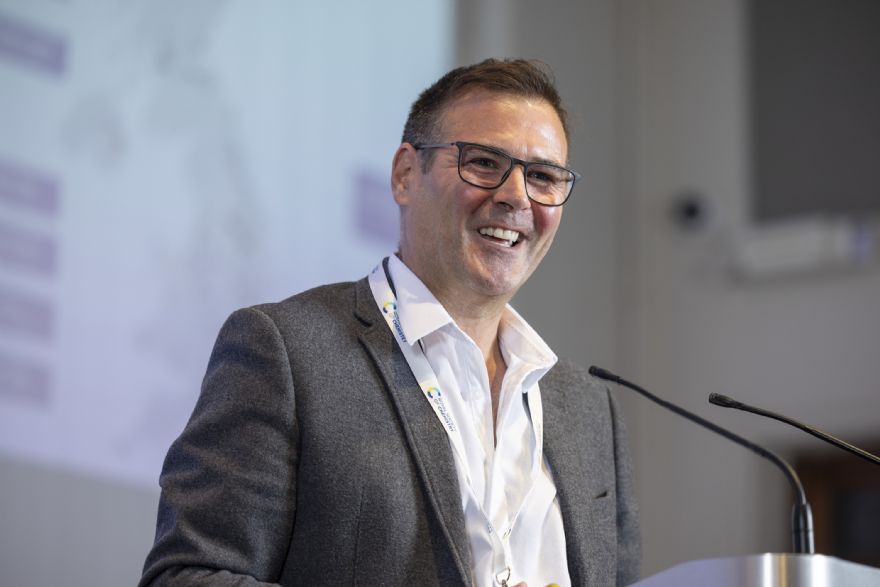 Dean Cook, executive director for Place and Global at Innovate UK
Dean Cook, executive director for Place and Global at Innovate UKThe Innovation Accelerator pilot programme, a Government-backed scheme, has delivered a major boost to regional economies, generating more than £140 million in new investment and creating up to 250 full-time equivalent jobs across the West Midlands, Greater Manchester and the Glasgow City Region.
Launched in April 2022, and funded by
Innovate UK, working with
UK Research and Innovation (UKRI) and the
Department for Science, Innovation and Technology (DSIT), the pilot programme pioneers a new funding approach, co-created with local leadership to fast-track high-growth industries and harness regional strengths.
Glasgow City Region is demonstrating the power and impact of the triple helix model — combining public sector backing, academic expertise, and private sector investment. This collaborative approach is accelerating innovation to market, creating high quality local jobs, building sustainable supply chains, and has already leveraged over £47 million in private sector investment.
Greater Manchester is using the Innovation Accelerator to advance its strengths in advanced materials and manufacturing, digital and tech, and low carbon and health innovation, while placing a strong emphasis on social inclusion. The Centre for Digital Innovation project has offered skills development and community outreach to all 10 of the city-region’s boroughs through its network of further education colleges, while the Turing Innovation Catalyst is helping people from underrepresented groups develop a career in artificial inteligence (AI).
The West Midlands is accelerating R&D and innovation strengths ‘greener’ technologies and improved personalised and digital healthcare, diversifying its economy while boosting supply chains. Furthermore, indications show by the end of 2025, 161 jobs will have been created in the region through this programme. With an initial £100 million investment, plus a £30 million extension secured for 2025/26, this pilot is generating regional growth and vibrant innovation ecosystems. The Innovation Accelerator pilot is also bringing new technology, products and services to market.
‘Digital twin’In the West Midlands, the Clean Futures programme helped to develop a new coating for electric vehicle (EV) batteries to extend their life, while also supporting startup Moonbility, to create an AI ‘digital twin’ platform to help rail operators respond faster to disruptions in a proof-of-concept for London North Eastern Railway.
Meanwhile, in Greater Manchester, MediaCities’ Immersive Tech Innovation Hub is advancing cutting-edge immersive technologies across the creative sectors, encouraging interdisciplinary collaboration and creative R&D, promoting the role of immersive tech in solving real-world challenges and driving inclusive economic growth through creative innovation.
In the Glasgow City Region, the Critical Technologies Accelerator (CTA) is strengthening Glasgow’s leadership in photonics, semiconductors and quantum technologies — enabling local companies to develop advanced hardware with applications across space, secure communications, sensing and next-generation electronics. The programme has already enabled two high-potential spin-outs — Kelvin Quantum and Quantcore — alongside wider industry collaborations that are helping accelerate the commercialisation of critical technologies and open up new markets.
The Government is now building on its success through a Local Innovation Partnerships Fund of up to £500 million, which is part of the wider £86 billion of R&D funding announced ahead of the Spending Review to turbo-charge the fastest growing sectors, from tech and life sciences, to advanced manufacturing and defence.
This new fund will empower local leaders across the UK to target their research investment in their regions, boosting high skilled jobs and igniting growth — the core mission of the Government’s Plan for Change.
Driving economic growthScience Minister Lord Vallance said: “These findings show the important part that leaders who know their regions best can play in capitalising on local strengths to improve lives and create new jobs, from healthcare, to space technology and advanced manufacturing to AI. The Government is building on these promising investments into Glasgow, Greater Manchester and the West Midlands, with up to £500 million of further local partnership funding for regions in every corner of the UK, so that more excellent, local expertise can be channelled into driving economic growth.”
Dean Cook, executive director for Place and Global at Innovate UK, added: “The Innovation Accelerator pilot has proven the power of place-based innovation to unlock economic potential and transform regional research and design (R&D) ecosystems. By building on the distinct strengths of the West Midlands, Greater Manchester and Glasgow City Region, we have seen clusters of innovation flourish by attracting significant co-investment, creating new products and services, and delivering hundreds of high-value jobs.
“At the heart of our approach lies the principle of co-creation, recognising the wisdom of local people with a deep understanding of local strengths to be built upon. This local knowledge is complemented by Innovate UK’s reach as the national innovation agency, linking these regional clusters with opportunities provided by national and international networks. The Innovation Accelerator pilot has proven to be a strategic commitment to developing thriving innovation clusters that continues to drive long-term prosperity for the UK.”
To discover how Innovate UK's Innovation Accelerator pilot is shaping the future of innovation across the West Midlands, Greater Manchester and the Glasgow City Region, visit the Innovate UK Business Connect website
here.